Iran's Guards Continue Claiming 'Victory' Against US Navy

Iran’s Revolutionary Guard carries on with its story of having snatched an oil tanker from the hands of the US Navy in the Sea of Oman, denied by Washington.

Iran’s Revolutionary Guard carries on with its story of having snatched an oil tanker from the hands of the US Navy in the Sea of Oman, denied by Washington.
As Iran freed a Vietnamese-flagged oil tanker on Tuesday that it claimed to have seized when the US Navy tried to impound Iran’s oil, the chief commander of the IRGC spoke at a ceremony in his military headquarters.
General Hossein Salami praised those who created a “legend” by confronting the US Navy and called it an “honorable battle” that would “remain in the history of Islam”. He said that the victory allows Iran to belittle the “terrorist regime” of the United States and its “waning empire”.
After Iran claimed it had driven off the US Navy, the Biden Administration last week denied such any confrontation, saying that its vessels witnessed Iranian forces seizing a Vietnamese-flagged tanker in the Sea of Oman in October but did not intervene. Vietnam later confirmed its tanker was being held in Iranian waters.
But the IRGC has stuck to its story that it won an important victory against the US Navy, although no shots were fired.
Tensions remain high in the region as the future of nuclear talks between Iran and world powers remains uncertain. Iran has hardened its position for the upcoming resumption of negotiation at the end of November.
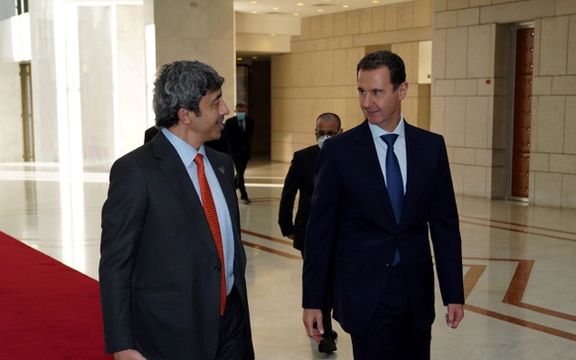
Washington is expressing strong opposition to re-engaging with Syria's Bashar Assad after UAE's foreign minister met with Syria’s once widely shunned president in Damascus on Tuesday.
The visit by Sheikh Abdullah bin Zayed Al Nahyan is the first by an Emirati foreign minister since Syria's civil war erupted in 2011. It comes as some Arab countries are improving ties with Syria.
"We will not normalize or upgrade our diplomatic relations with the Assad regime, nor do we support other countries normalizing or upgrading their relations, given the atrocities that this regime has inflicted on its own people," said State Department spokesman Ned Price.
Syria badly needs to boost relations with oil-rich countries as its economy is being strangled by crippling Western sanctions and it faces the task of post-war reconstruction.
It is not clear how Washington would react if the rapprochement between Syria and Gulf Arab countries extends to economic relations, given US sanctions on Damascus.
Most Gulf countries, at odds with regional rival Iran, seek warmer ties with Damascus, hoping to peel it away from Tehran.
The UAE is also home to thousands of Syrians who work in the Gulf nation and send money to their relatives at home.
Reporting by AP

Sitting on 17 percent of world gas reserves, Iran should have no trouble renewing a contract to supply gas to Turkey that expires in 2025. So why are there concerns in Tehran?
As the Iranian Minister of Oil Javad Owji announced September, Iran faces a daily gas deficit of 200 million cubic meters next winter and will mean reducing exports to both Turkey and Iraq. According to Owji, Iran's oil and gas industry must invest $160 billion to avoid becoming a net energy importer.
But Iran’s average daily production of gas in 2020 was less than 700 million m3 per day, meaning the government will struggle to both export gas and meet domestic demand, including industry and power plants.
Reviving its 2015 nuclear agreement with world powers and seeing the lifting of United States ‘maximum pressure’ sanctions should enable Iran to both increase oil and gas production, meaning it can supply domestic needs and maintain the Turkish market after it can upgrade its production infrastructure.
But Turkey's potential for renewables, along with its plans to extract gas from the Sakarya field in the Black Sea and to bring online its first nuclear power plant by 2023, all show Ankara can provide its own energy security without Iran.
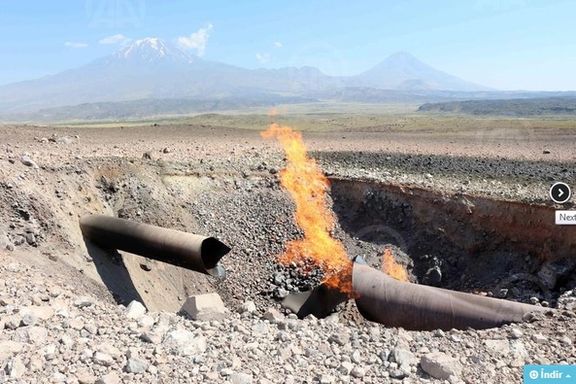
This means Tehran should start negotiations now to extend its 25-year contract to supply gas to Turkey, which expires in four years. Energy exports play an important role in creating interdependence between countries, and so help resolve tensions.
Importing Iranian gas fits Turkey’s policy of diversification, with a goal of no source providing more than 30 percent.According to Turkey’s Energy Market RegulatoryAuthority, 3.48 billion cubic meters (m3) of its gas imports came in July through pipelines and 568 m3 as liquified natural gas (LNG). In the same month, imports from Russia were 2.3 billion m3, while imports from Iran and Algeria were 633 million m3 and 568.5 million m3 respectively. Turkey imports from Iran only 11 percent of the gas it consumes.
But there is another factor that may shape Iranian gas supplies to Turkey. Azerbaijan Energy Minister Perviz Shahbazov announced in October that Baku planned to increase its exports to Turkey from 6 billion m3 to 9 billion m3 by 2024.
In the short term some Iranian experts believe Turkey's new gas contract with Azerbaijan would suit Turkey's aim of diversification and did not mean Ankara wanted to exclude Iran.
Turkey’s aim is not just to buy gas at the lowest price.The Turkish Natural Gas Market Report published by Ankara’s Energy Market Regulatory Authority (EMRA) on October 1 stressed the importance for Turkey in becoming a regional energy trading center.
Iran has a small share of the global gas market, with just 6.5 percent of world production, despite its large gas reserves of 251 billion m3, 17.1 percent of the world total. While Tehran before ‘maximum pressure’ supplied oil as well as gas to Turkey, it needs now to increase its share of the regional gas market. Iranian officials also believe Turkey is a promising route for gas exports to Europe.
Despite Europe’s energy crisis, and a growing international preference for gas as a relatively ‘clean’ fuel, Iran faces the double challenge of high domestic gas consumption and a lack of the capital and technology needed to increase production. Both stymie Iran from being a reliable producer or exporter.

A Vietnamese-flagged oil tanker that American officials said was seized by Iran last month has left Iran and entered the Gulf of Oman on Wednesday.
An Iranian official at Bandar Abbas port told Reuters the tanker Sothys left Iran late on Tuesday "after its oil cargo was unloaded", giving no details on the crew.
Refinitiv ship tracking data showed the ship had been near Bandar Abbas on Tuesday but was early on Wednesday listed as at anchor off the coasts of Oman and the United Arab Emirates in the Gulf of Oman. No destination was listed for the ship.
Iran's Revolutionary Guards a week ago claimed they thwarted an attempt by the United States to detain a tanker carrying Iranian oil in the Sea of Oman. State-controlled media proclaimed it as a big victory against the US and several different versions of the event were presented.
The US denied this saying Iranian forces had seized a Vietnamese-flagged tanker in late October.
Vietnam’s foreign ministry confirmed on November 4 that it was in talks with Iran over the seizure of the tanker.
With reporting by Reuters
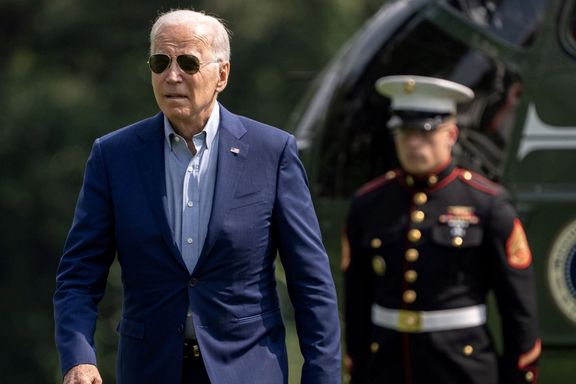
President Joe Biden on Tuesday renewed the 1979 US national emergency with respect to Iran, pursuant to the International Emergency Economic Powers Act.
The national emergency was announced on November 14, 1979 when radical students in Tehran seized the US embassy and took hostage dozens of diplomats, staff and guards.
The decision by then-president Jimmy Carter was meant “to deal with the unusual and extraordinary threat to the national security, foreign policy, and economy of the United States constituted by the situation in Iran.”
In renewing the national emergency Biden said, “Our relations with Iran have not yet normalized, and the process of implementing the agreements with Iran, dated January 19, 1981, is ongoing. For this reason, the national emergency declared on November 14, 1979, and the measures adopted on that date to deal with that emergency, must continue in effect beyond November 14, 2021.”
A different national emergency with respect to Iran was declared by former president Bill Clinton in March 1995, which Biden renewed on March 5 for one year.
Multilateral talks with Iran to revive the 2015 nuclear agreement (JCPOA) will later this month, but Iran has adopted a tough posture and optimism with regard to the success of the talks is not very high.
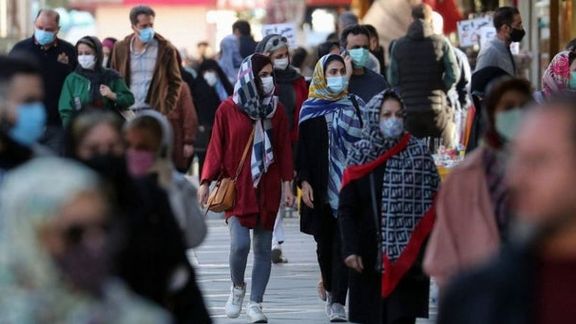
Opinion and analysis by Reza Behrouz and Mohammad R. Jahan-Parvar on IranPoll and the pitfalls of opinion surveys in an authoritarian environment.
------------------------------------------------------------------------------------------------------------
Every 6 to 12 months, a survey is conducted by a Toronto-based private firm called the IranPoll in conjunction with the University of Maryland's Center for International and Security Studies. It is a telephone-based public opinion survey of people residing in Iran. The results are then published online and almost always showcased by Washington think-tanks such as the Atlantic Council. Despite enjoying a partnership with a major American research university, the results of IranPoll are never subjected to academic scrutiny or published in a peer-reviewed journal.
IranPoll prides itself on using sound scientific methodology, which includes sequential randomizations, catch-all geographic breadth, and the ability to conduct interviews in multiple ethnic languages and dialects, in addition to Persian. Yet, the survey’s intent and its results often generate controversy and outrage, rather than offering practical information conducive to policy-making.
In reaction to IranPoll, there is always a deluge of indignation on the part of Iranians inside the country and in the diaspora who consider the results outlandish and detached from reality. The main argument raised by Iranians against IranPoll is the unrealistic expectation that politically-oriented surveys can ever be conducted in a totalitarian dictatorship such as the Islamic Republic. Opinion polls administered in authoritarian states naturally call into question the authenticity and honesty of participants when responding to politically-sensitive queries. There is little doubt that fear of retribution influences how surveyees reply to certain politically-sensitive questions.
There are also features associated with IranPoll that are scientifically flawed. The survey’s methodology has been described in a cursory fashion on IranPoll’s website, leaving ample room for doubt about the validity of the data collection process. For example, participants are selected amongst Iranians who have access to landline telephones, excluding a large segment of the population that exclusively uses mobile devices. This narrows the testing sample and introduces bias at the very outset. The process by which participants’ telephone numbers are obtained is, of course, not detailed. It should be noted that every landline telephone number is attached to a physical address, which could theoretically be accessed by the Islamic Republic's security apparatus. This factor can influence the authenticity and integrity of responses.
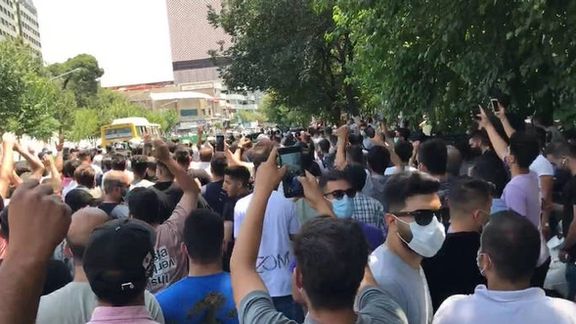
The survey goes through a succession of awkward randomizations to enroll participants. Excessive stratification using multiple randomizations eliminates balanced participant enrollment, countering the effect and the value of random sampling.
IranPoll states, “[w]hen a residence is reached, a qualified respondent is randomly selected from within that household, often using the random table technique.” IranPoll documentation does not describe the inclusion criteria for the “qualified” respondent. Assuming that being an adult is the foremost criterion, randomization would fail if a household consists of only one adult. This conundrum is also applicable to a situation in which the randomly-selected respondent is disabled and unable to participate. It is unclear how these situations are dealt with by the surveyors.
The cooperation rate for the latest IranPoll survey was 79%. Typical cooperation rate in public opinion surveys is about 30%, with any rate above 50% considered “excellent.” A nearly 80% cooperation rate without incentive is astronomical, considering Iran’s stifling political atmosphere. One is forced to view this outcome as “too good to be true.”
The same argument can be made about the overall response rate of 60%. A realistic response rate ranges between 5% and 30%. A response rate of 60% and a cooperation rate of 79% do not mean each respondent completed the survey and answered every question. Had the survey been offered online, these figures would be more convincing, but it is inconceivable that such a large proportion of people would hold the telephone line long enough to complete the survey in its entirety. That is why nowadays multi-question surveys are typically conducted online (alternatively on paper forms), while single-question polls are predominantly carried out via telephone query.
IranPoll naturally does not offer any information on the completion rates. Assuming cooperation rate means replying to any one or more questions on the survey, IranPoll intentionally conceals the rate at which individual questions were answered. The more participants refrain from responding to a specific question, the smaller the sample size per question and the less accurate the results. For instance, if only 50 people replied to the question on President Ebrahim Raisi’s favorability, it would take a mere 39 favorable opinions to achieve the 78% rate demonstrated in the results. Fifty respondents constitute only 5% of the entire sample. This pitfall applies across the board to all questions on the survey; from President Joe Biden’s popularity amongst the Iranian people, to their opinion on U.S. sanctions and the nuclear deal.
Additionally, IranPoll’s results are in sharp contrast to the findings of online multi-question surveys such as the Netherlands-based GAMAAN (the Group for Analyzing and Measuring Attitudes in IRAN). As an example, the proportion of respondents in IranPoll who indicated their intention to vote in the June 2021 presidential elections exceeds that of GAMAAN’s by 24 percentage points. The level of trust in the Islamic Republic of Iran Broadcasting (IRIB) service is yet another example. IranPoll reported that about 50% of their survey-takers trusted IRIB’s reporting “most of the time,” while GAMAAN’s number was only at 14%.
GAMAAN’s methodology certainly has its own shortcomings, but its online format mitigates the challenges associated with telephone-based multi-question surveys. Research has consistently shown that respondents tend to give more extreme, positive answers to attitudinal items than when the same questions are administered to them via the web. There are also indications that the social interaction inherent in a telephone interview may exert pressure on respondents, affecting how they answer questions. Although gross discrepancies between the two surveys’ reported findings can be attributed to “mode effect,” differences in responses by survey mode are typically not large. As such, the magnitude of differences between GAMAAN and IranPoll’s resultsare too significant to ignore.
Overall, there are notable flaws in IranPoll’s methodology, as well as how the results are presented. To the best of our knowledge, the method by which this survey is conducted has never been validated. In other words, its replicability and generalizability are highly questionable. IranPoll does correlate the demographics of its sample with those of Iran national census and the Central Intelligence Agency’s Factbook, and makes an attempt at validation by matching the statistics it generates with official data divulged by the regime itself. For example, IranPoll produced a 52.9% participation rate in the 2021 presidential elections. This figure was then juxtaposed with the 48.9% turnout reported by the Islamic Republic in an attempt to ostensibly demonstrate accuracy and replicability. It is impossible to ascertain the credibility of the voter turnout stated by the regime when the elections are far from free and fair.
Lastly, it is appropriate to also understand who are the key players behind the University of Maryland’s IranPoll. To that end, we encourage the reader to review an article by Ahmad Rafat in Kayhan Life.
Given IranPoll’s socially objectionable results, its methodological flaws, the way findings are presented, and the fact that it evades peer review and scientific scrutiny, an impartial observer is compelled to view the survey with suspicion. Such an observer may reasonably conclude that this survey is little more than a propaganda ploy by the Isalmic Republic to influence the United States’ policies vis-à-visthe regime. The data IranPoll provides each cycle are outrageously predictable and oftentimes, downright preposterous. Many residents of Iran and members of the diaspora view this survey as a source of humor and an object of ridicule. Think-tanks that tout IranPoll as an astounding and authentic revelation from inside Iran should thoroughly examine the merits and validity of this survey. Likewise, the University of Maryland should consider whether associating its name with such a scientifically dubious and politically controversial project is in the best interest of the institution.
Dr. Reza Behrouz is an Iranian-American physician and medical researcher based in San Antonio, TX, USA.
Mohammad R. Jahan-Parvar PhD is an Iranian-American economist based in Washington, DC, USA.
The opinions expressed by the authors do not necessarily reflect the views of Iran International